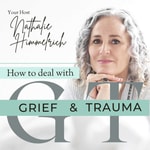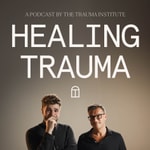How To Deal With Grief and Trauma – Details, episodes & analysis
Podcast details
Technical and general information from the podcast's RSS feed.

How To Deal With Grief and Trauma
Nathalie Himmelrich
Frequency: 1 episode/9d. Total Eps: 103

Recent rankings
Latest chart positions across Apple Podcasts and Spotify rankings.
Apple Podcasts
🇬🇧 Great Britain - mentalHealth
18/02/2025#85
Spotify
No recent rankings available
Shared links between episodes and podcasts
Links found in episode descriptions and other podcasts that share them.
See allRSS feed quality and score
Technical evaluation of the podcast's RSS feed quality and structure.
See allScore global : 78%
Publication history
Monthly episode publishing history over the past years.
97 Tori Press | California Wildfires: Loss and Trauma in the Face of Natural Disaster
Season 10 · Episode 97
lundi 3 février 2025 • Duration 41:00
HOW TO DEAL WITH GRIEF AND TRAUMA is completely self-funded, produced, and edited by me, Nathalie Himmelrich.
Consider making a small donation to support the Podcast: bit.ly/SupportGTPodcast. Thank you!
For more information, please visit Nathalie’s website, join the podcast’s Instagram page, and subscribe to the newsletter to receive updates on future episodes here.
About this week’s episodeI’ve spoken to today’s guest Tori in S4 E39 so I recommend listening to her personal story there.
For today's episode, I invited Tori to speak with me about her experience, who is living just miles from where wildfires in California have recently devastated an entire community. Together, we talk about what it’s like to be so close to this kind of tragedy, the emotional impact on both survivors and those supporting them, and what we can do to help.
About this week’s guestTori Press is an artist, author, and anxious human being. She spent 10 years as a graphic designer before quitting to create some space in her life. In 2016 she bought herself a set of markers and began drawing pictures inspired by her yoga practice, mental health struggles, and everyday life. This decision started her on an extraordinary adventure of self-discovery and human connection. Her drawings help her cultivate mindfulness, gratitude, and self-acceptance–and she hopes they do the same for others!
She is the author of two books: How to Feel Better, a companion and workbook for dealing with tough times (including grief and loss), and I Am Definitely, Probably Enough (I Think).
Tori’s links: Website | Instagram
Resources mentioned in this episodeAnother episode with Tori:
S4 E39 When Grieving Dad Equals the Loss of a Challenging Relationship
Find support:
Support the show:
- Become a supporter of the show! Starting at $3/month
- Join Facebook Group - Grief and Trauma Support Network
- Download the FREE grief resource eBook
- Book a Discovery Call
- Leave a review
Follow on socials:
96 Shelby Forsythia | Political Grief
Season 10 · Episode 96
lundi 20 janvier 2025 • Duration 37:32
HOW TO DEAL WITH GRIEF AND TRAUMA is completely self-funded, produced, and edited by me, Nathalie Himmelrich.
Consider making a small donation to support the Podcast: bit.ly/SupportGTPodcast. Thank you!
For more information, please visit Nathalie’s website, join the podcast’s Instagram page, and subscribe to the newsletter to receive updates on future episodes here.
About this week’s episodeI’ve spoken to today’s guest, Shelby in S3E29 so I recommend listening to her personal story there.
For today's episode, I invited Shelby back to speak about the topic of loss and/or trauma, at least for some, experienced following the most recent new election of the American president or how she worded it in one of her newsletters: “Thoughts for election despair” and how it affects her.
Upon my invitation to speak with her for the podcast, Shelby wrote to me: “Full disclosure: I'll be coming with my progressive perspective as a woman, queer person, and grief business owner, so I really can't speak to the perspective of anyone who's overjoyed at Trump's return to office.”
About this week’s guestShelby Forsythia (she/her) is a grief coach, author, and podcast host. In 2020, she founded Life After Loss Academy, an online course and community that has helped dozens of grievers grow and find their way after death, divorce, diagnosis, and other major life transitions.
Following her mother’s death in 2013, Shelby began calling herself a “student of grief” and now devotes her days to reading, writing, and speaking about loss. Through mindfulness tools and intuitive, open-ended questions, she guides her clients to welcome grief as a teacher and create meaningful lives that honor and include the heartbreaks they’ve faced. Her work has been featured in Huffington Post, Bustle, Newsweek, and The Oprah Magazine. She considers herself a politically progressive, honoring her identities as a queer woman and grief guide.
Shelby’s links: Website | Instagram
Resources mentioned in this episodeOther episode with Shelby:
- S3 E29 Mother-loss as a Young Adult
Find support:
Support the show:
- Become a supporter of the show! Starting at $3/month
- Join Facebook Group - Grief and Trauma Support Network
- Download the FREE grief resource eBook
- Book a Discovery Call
- Leave a review
Follow on socials:
88 Rachel Tenpenny | Grieving Parents 10 Years Later
Season 9 · Episode 88
vendredi 11 octobre 2024 • Duration 56:47
HOW TO DEAL WITH GRIEF AND TRAUMA is completely self-funded, produced, and edited by me, Nathalie Himmelrich.
Consider making a small donation to support the Podcast: bit.ly/SupportGTPodcast. Thank you!
For more information, please visit Nathalie’s website, join the podcast’s Instagram page, and subscribe to the newsletter to receive updates on future episodes here.
About this week’s episodeWelcome to a special series of podcast episodes in honor of the 10th anniversary of my first book, Grieving Parents: Surviving Loss as a Couple, published in 2014. To mark this milestone, I’m reconnecting with the same parents I initially interviewed for the book, offering a unique opportunity to revisit their stories and gain a deeper understanding of their journeys—now, with the perspective of a decade.
In recognition of October being Pregnancy and Infant Loss Awareness Month, this series is dedicated to showcasing how grieving parents have coped with their loss and trauma over the years. These episodes aim to offer a long-term view of life after the loss of a pregnancy or infant, providing comfort, insight and hope to those who may still be navigating their own grief.
Additionally, I’m excited to offer Healing Steps, my audio course, at 25% off this month. Use the coupon code HSOCT24 to access the course and begin your own journey toward healing. (https://www.griefandtraumaacademy.com/healing-steps-course)
Helping people through grief is Rachel’s passion. After her twin baby daughters Aubrey and Ellie died in 2008, she made a promise to them that she’d learn how to heal after loss and share what she learned with everyone who wants to heal too. Rachel has spent more than a decade making good on her promise and has helped hundreds of clients build a meaningful and purposeful life after loss.
Resources mentioned in this episodeOther episodes with Rachel:
Find support:
Support the show:
- Become a supporter of the show! Starting at $3/month
- Join Facebook Group - Grief and Trauma Support Network
- Download the FREE grief resource eBook
- Book a Discovery Call
- Leave a review
Follow on socials:
2 Katja Faber | Homicide Loss – Effect on the Victim’s Family Part 1
Season 1 · Episode 2
lundi 4 juillet 2022 • Duration 45:23
‘I wish to be ok with it if for no other reason than I owed it to myself and to my still-living children and those that care about me. Because they have a right to have a full and beautiful life, and having a mother that's traumatised and overwhelmed by something that she has no control over is not doing anybody any favours.’
Katja’s story is extraordinary and has made waves in the media worldwide. Since the recording of this episode a few weeks ago the court case has taken place at the high court in Zurich, and the killer was convicted. We are planning to do Part 2 of this interview in a few weeks so stay tuned.
About this week’s guestKatja Faber is the mother of three children. Following her 23-year-old son's murder in Switzerland, she used her legal training to work closely with lawyers and the State Prosecutor to secure justice for her dead son. Through her writing at Still Standing Magazine and other grief-related publications, she hopes to break the taboo of homicide loss and child loss. She runs her own fruit farm and is an advocate of ecotherapy as a means of finding healing following a traumatic loss. Katja is a certified Compassionate Bereavement Care® counselor through the Center for Loss and Trauma in partnership with the MISS Foundation and the Elisabeth Kubler-Ross Family Trust.
Topics discussed in this episode- Homicide loss – how a parent deals with the loss, the grief, the trauma, and the legal system
- Self-care, writing, nature, family support, support groups
- Siblings grief, mothering living children who grieve their brother
- Dealing with the media and the added pain caused by media coverage
- Judgment or misunderstanding of the surroundings
- Re-traumatizing the victim’s family through ongoing trials
- The aspect of grief being to some degree public due to trials
- How to continue living with the fact that the killer is still out there alive
- The importance of accountability
- Nathalie’s book Surviving My First Year of Child Loss: Personal Stories From Grieving Parents
- The Compassionate Friends Facebook Groups
--> For more information, please visit
Find support:
Support the show:
- Become a supporter of the show! Starting at $3/month
- Join Facebook Group - Grief and Trauma Support Network
- Download the FREE grief resource eBook
- Book a Discovery Call
- Leave a review
Follow on socials:
1 Rachel Tenpenny | Why and How Healing Is Possible
Season 1 · Episode 1
dimanche 26 juin 2022 • Duration 55:20
‘Whether healing is possible or not, is irrelevant. It has to be possible for me because this is the life that I want, and I am not willing to give up.’
Rachel Tenpenny gave birth to twin girls Aubrey and Ellie on June 24th, 2008. They both died a few days after their birth. Rachel talks to us about her grieving and healing story and how she came to strongly believe that healing is possible
About this week’s guestRachel Tenpenny is a grief expert, emotional well-being specialist, and life-after-loss coach. With over 13 years of experience healing her own heart after her baby daughters died in 2008, she has helped hundreds of people find healing after life’s most painful experiences. Rachel believes grief is not forever and teaches grievers how to heal physically and emotionally with a unique and effective holistic approach to cultivating healing that lasts a lifetime. Originally from a small town in Southern California, she now lives in Northern Virginia with her two boys, Dustin and Colton.
Topics discussed in this episode- Why and how healing is possible
- A society that does not understand grief and how confused we are about grief
- What does it look like when ‘grief isn’t forever'?
- We don’t have to be isolated in our grief
- Debunking grief myths
- ‘Time heals all wounds’: Time is just time, it is what we choose to do with time
- Grief skills are life skills and need to be learned
--> For more information, please visit Nathalie’s website.
--> Subscribe to the newsletter to receive updates on future episodes here.
--> Join the podcast’s Instagram page.
Thanks for listening to HOW TO DEAL WITH GRIEF AND TRAUMA. If you’d like to be updated on future episodes, please subscribe to my newsletter on Nathalie Himmelrich.com
If you need grief support, please contact me for a FREE 30 min discovery session.
HOW TO DEAL WITH GRIEF AND TRAUMA is produced and edited by me,
Find support:
Support the show:
- Become a supporter of the show! Starting at $3/month
- Join Facebook Group - Grief and Trauma Support Network
- Download the FREE grief resource eBook
- Book a Discovery Call
- Leave a review
Follow on socials:
TRAILER: How To Deal With Grief & Trauma
Season 1
mardi 21 juin 2022 • Duration 03:37
Welcome to HOW TO DEAL WITH GRIEF AND TRAUMA, a podcast where on each episode we will hear from people - like you – who have lived through heart-breaking losses and traumas.
In this episode, you will hear about
- me, Nathalie Himmelrich, your host
- what this podcast is about and how it is structured, and
- what prompted me to start it
Sign up here to receive notification of upcoming episodes being released: HOW TO DEAL WITH GRIEF AND TRAUMA Updates
--> For more information, please visit Nathalie’s website.
--> Subscribe to the newsletter to receive updates on future episodes here.
--> Join the podcast’s Instagram page.
Thanks for listening to HOW TO DEAL WITH GRIEF AND TRAUMA. If you’d like to be updated on future episodes, please subscribe to my newsletter on Nathalie Himmelrich.com
If you need grief support, please contact me for a FREE 30 min discovery session.
HOW TO DEAL WITH GRIEF AND TRAUMA is produced and edited by me, Nathalie Himmelrich.
Please support this PodcastTo support this podcast, please rate, review, subscribe to, or follow the podcast on Apple, Spotify, or wherever you get your podcasts. Thank you.
Remember to keep breathing, I promise, it will get easier.
Find support:
Support the show:
- Become a supporter of the show! Starting at $3/month
- Join Facebook Group - Grief and Trauma Support Network
- Download the FREE grief resource eBook
- Book a Discovery Call
- Leave a review
Follow on socials:
87 MC McDonalds | Orphaned by 25
Season 9 · Episode 87
lundi 30 septembre 2024 • Duration 48:08
HOW TO DEAL WITH GRIEF AND TRAUMA is completely self-funded, produced, and edited by me, Nathalie Himmelrich.
Consider making a small donation to support the Podcast: bit.ly/SupportGTPodcast. Thank you!
For more information, please visit Nathalie’s website, join the podcast’s Instagram page, and subscribe to the newsletter to receive updates on future episodes here.
About this week’s episodeI first encountered Mary Catherine McDonald through her powerful presence on social media, where she consistently shares insightful perspectives on trauma and healing. Her way of showing up with authenticity and clarity immediately drew me in. I was further captivated when I heard her speak in several podcasts and at a recent online trauma conference, where her depth of knowledge and her insights left a lasting impression. Mary Catherine’s ability to articulate the complexities of trauma while offering hope and practical guidance has encouraged me to invite her onto the podcast as a guest.
Her definition of trauma, which I love, is:
Trauma is an unbearable emotional experience that lacks a relational home.
Mary Catherine (MC) McDonald, PhD, is a research professor and life coach who specializes in the psychology of trauma, stress, and resilience. She has been researching, lecturing, and publishing on the neuroscience, psychology, and lived experience of trauma and stress for over a decade. She is passionate about destigmatizing trauma, stress, and mental health issues in general, as well as reframing our understanding of trauma in order to better understand and treat it.
- Website: alchemycoaching.life
- IG: @mc.phd
- TikTok: www.tiktok.com/@mc.phd
- Episode with Deb Dana: bit.ly/PodDeb
- Episode with Dr Mary-Frances O'Connor: bit.ly/PodMary
- Episode about Grief Dreams: bit.ly/PodJoshua
Find support:
Support the show:
- Become a supporter of the show! Starting at $3/month
- Join Facebook Group - Grief and Trauma Support Network
- Download the FREE grief resource eBook
- Book a Discovery Call
- Leave a review
Follow on socials:
86 Nathalie Himmelrich | Building Resilience in the Context of Grief and Trauma
Season 9 · Episode 86
lundi 16 septembre 2024 • Duration 11:59
HOW TO DEAL WITH GRIEF AND TRAUMA is completely self-funded, produced, and edited by me, Nathalie Himmelrich.
Consider making a small donation to support the Podcast: bit.ly/SupportGTPodcast. Thank you!
For more information, please visit Nathalie’s website, join the podcast’s Instagram page, and subscribe to the newsletter to receive updates on future episodes here.
About this week’s episodeWelcome to today's episode of our podcast where we look at how to build resilience when dealing with grief, loss or trauma.
When people hear the word, they often think of strength, bouncing back quickly, or being unaffected by hardship. But in the context of grief, loss, and trauma, resilience can look very different—it’s not about avoiding pain or pretending that everything is okay.
What is Resilience?
Resilience is the ability to continue functioning, even when life feels overwhelming. It’s about adapting to change and hardship in a way that allows you to keep moving forward, even if it’s at your own pace. It doesn’t mean you won’t feel the sadness, anger, or pain. In fact, resilience means you allow yourself to feel those emotions and still find a way to live through them.
In this episode, I want to share with you five practical ways to continue building resilience, no matter where you are in your journey of healing. These are simple, easy-to-follow steps that can help strengthen that inner part of you that’s already doing the work of surviving, processing, and adapting.
Remember, building resilience is a process, and there’s no rush. Take it day by day, and trust that you have the inner strength to weather the storm.
Resources mentioned in this episode- Episode 40: Trauma and Its Impact on the Nervous System
Find support:
Support the show:
- Become a supporter of the show! Starting at $3/month
- Join Facebook Group - Grief and Trauma Support Network
- Download the FREE grief resource eBook
- Book a Discovery Call
- Leave a review
Follow on socials:
85 Deb Dana | Loss Through the Lens of Polyvagal Theory
Season 9 · Episode 85
lundi 2 septembre 2024 • Duration 53:26
HOW TO DEAL WITH GRIEF AND TRAUMA is completely self-funded, produced, and edited by Nathalie Himmelrich.
Consider making a small donation to support the Podcast: bit.ly/SupportGTPodcast. Thank you!
For more information, please visit Nathalie’s website, join the podcast’s Instagram page, and subscribe to the newsletter to receive updates on future episodes here.
About this week’s episodeDeb Dana’s influence first started with her publications and her online workshops, through which she allowed me insights into Polyvagal Theory from a therapist's standpoint. Then, I had the privilege of meeting Deb personally during the Polyvagal Conference in Berlin, an experience that deeply impacted me personally and professionally. Her work on the Polyvagal Theory resonated with me profoundly, offering new insights into the connection between the nervous system and emotional well-being. Deb's compassionate approach and groundbreaking research helped me understand the importance of creating safety and connection in therapeutic settings. Her influence has shaped my practice, allowing me to support my clients more effectively, while also guiding my own journey towards greater self-awareness and emotional resilience.
In this episode, Deb shares how she dealt with the recent death of her husband Bob and takes us through how we can trust our nervous system to guide the way through grief.
About this week’s guestDeb Dana, LCSW, is a clinician, consultant, author and speaker. Her work is focused on using the lens of Polyvagal Theory to understand and resolve the impact of trauma. She delves into the intricacies of how we can use an understanding of the organizing principles of Polyvagal Theory to change the ways we navigate our daily lives. Deb is well known for translating Polyvagal Theory into a language and application that is both clear and accessible and for her significant contribution pioneering Rhythm of Regulation® methodology, tools, techniques and practices which continue to open up the power of Polyvagal Theory for professionals and curious people from diverse backgrounds and all walks of life.
Deb’s published work includes The Polyvagal Theory in Therapy: Engaging the Rhythm of Regulation, Polyvagal Practices: Anchoring the Self in Safety, the Polyvagal Card Deck, and Anchored: How to Befriend Your Nervous System Using Polyvagal Theory.
Find support:
Support the show:
- Become a supporter of the show! Starting at $3/month
- Join Facebook Group - Grief and Trauma Support Network
- Download the FREE grief resource eBook
- Book a Discovery Call
- Leave a review
Follow on socials:
84 Nathalie Himmelrich | Understanding the Difference Between Grief and Depression
Season 9 · Episode 84
mardi 20 août 2024 • Duration 14:58
HOW TO DEAL WITH GRIEF AND TRAUMA is completely self-funded, produced, and edited by me, Nathalie Himmelrich.
Consider making a small donation to support the Podcast: bit.ly/SupportGTPodcast. Thank you!
For more information, please visit Nathalie’s website, join the podcast’s Instagram page, and subscribe to the newsletter to receive updates on future episodes here.
About this week’s episodeWelcome to today's episode of our podcast. Inspired by a clip I saw on Instagram where Elizabeth Gilbert speaks about the two distinctly different experiences, I feel it’s important to say a bit more.
We’re going to dive into understanding the intricacies of emotional health, specifically focusing on the differences between grief and depression. These are often conflated, but they are distinct experiences that require different approaches for effective support and management.
I’ve personally wrestled with both grief and depression at different stages of my life. My journey through these challenging emotional landscapes taught me a lot, and I hope to share some of that insight with you today.
Resources mentioned in this episode- Episode 40: Trauma and Its Impact on the Nervous System
Find support:
Support the show:
- Become a supporter of the show! Starting at $3/month
- Join Facebook Group - Grief and Trauma Support Network
- Download the FREE grief resource eBook
- Book a Discovery Call
- Leave a review
Follow on socials:









